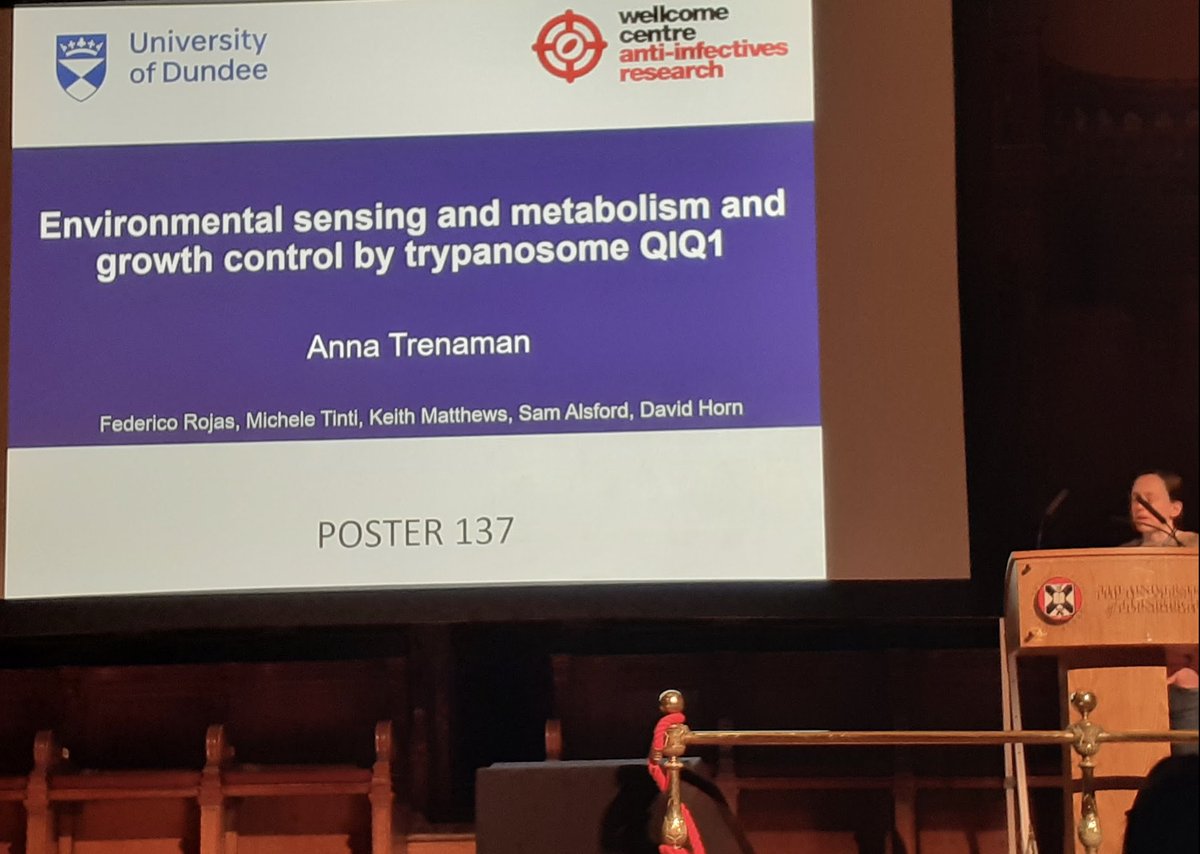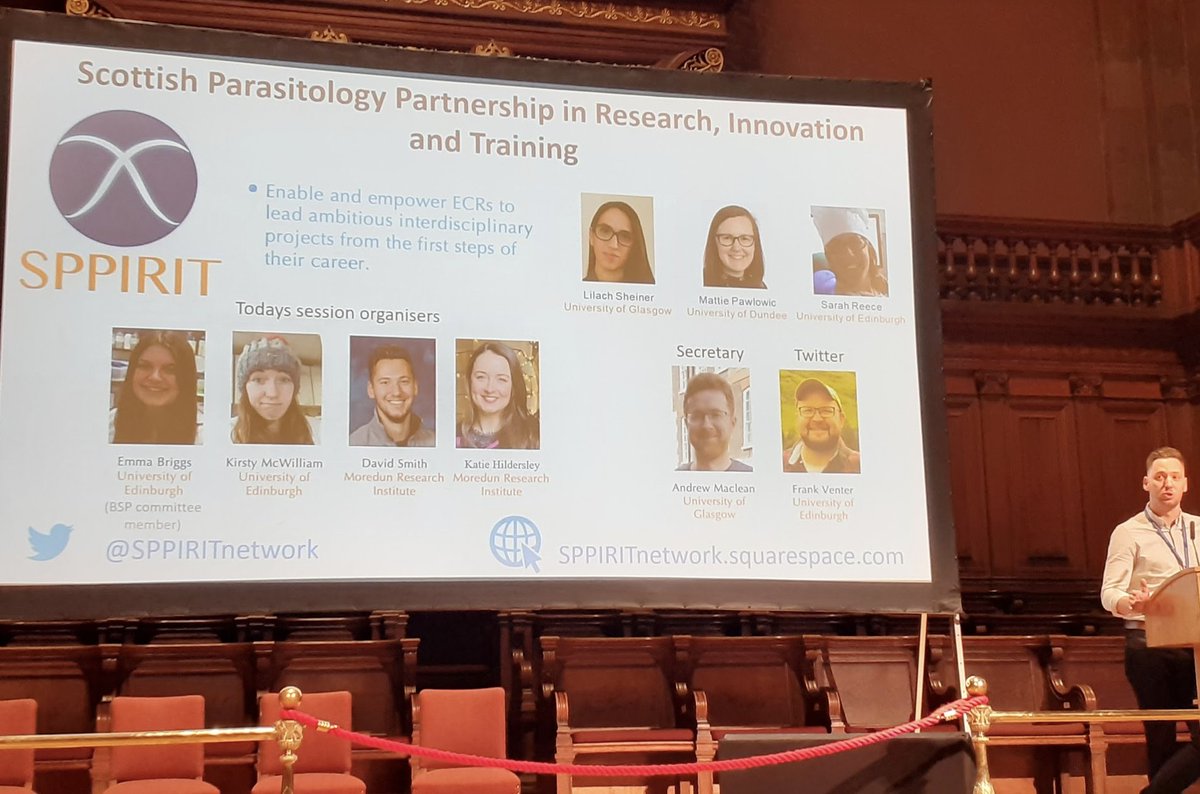Welcome to Day 2 (first scientific sessions) of #BSP2023 at @EdinburghUni in beautiful McEwan Hall! You can register each morning at McEwan Hall & make sure to pick up your abstract book & lanyard! #parasitology 



Here on Twitter, I will be tweeting from the first 2 plenary sessions at McEwan Hall, followed by sessions:
Protists 1: Development & Signalling
Protists 2: Parasite Interactions
and
Drugs, Vaccines, & Diagnostics
- I will retweet info from other parallel sessions! #BSP2023
Protists 1: Development & Signalling
Protists 2: Parasite Interactions
and
Drugs, Vaccines, & Diagnostics
- I will retweet info from other parallel sessions! #BSP2023
Our first Plenary session of #BSP2023 here at McEwan Hall is "A celebration of Gloria Rudenko within the saga of Antigenic Variation in Trypanosomes", delivered by Prof Keith Gull of @UniofOxford
bsp.uk.net/Gloria-Rudenko
bsp.uk.net/Gloria-Rudenko

Prof Keith Gull gives us an introduction to the history of antigenic variation, starting well before the birth of Dr Rudenko in 1961! An excellent introduction can be found in Harrison's 1947 review which you can access at annualreviews.org/doi/pdf/10.114… #BSP2023 #trypanosomes 

Of course, the game-changer in the antigenic variation was the publication in 1969 of Vickerman & Luckins' "Localization of Variable Antigens in the Surface Coat of Trypanosoma brucei using Ferritin Conjugated Antibody" (nature.com/articles/22411…). #BSP2023
As another comprehensive review by Borst & Cross appeared in 1982 (bit.ly/402rZRL), Dr Rudenko became a student at Yale University before moving to the Netherlands where she ultimately undertook a PhD with Prof Piet Borst & her work in antigenic variation began! #BSP2023
A handful of Dr Rudenko's earlier papers (5 from her PhD alone!):
- RNA polymerase I in T. brucei ('91): embopress.org/doi/abs/10.100…
- VSG gene expression control ('94): embopress.org/doi/abs/10.100…
- Ribosomal DNA promoter switch ('95): sciencedirect.com/science/articl…
#BSP2023
- RNA polymerase I in T. brucei ('91): embopress.org/doi/abs/10.100…
- VSG gene expression control ('94): embopress.org/doi/abs/10.100…
- Ribosomal DNA promoter switch ('95): sciencedirect.com/science/articl…
#BSP2023
And later, Dr Gloria Rudenko expanded on this work while being instrumental in the sequencing #Trypanosoma genomes:
- Telomere exchange in VSG switching ('96): sciencedirect.com/science/articl…
- BACs of DNA from expression sites ('02): sciencedirect.com/science/articl…
- Epigenetics &...
- Telomere exchange in VSG switching ('96): sciencedirect.com/science/articl…
- BACs of DNA from expression sites ('02): sciencedirect.com/science/articl…
- Epigenetics &...
... transcriptional control ('10): portlandpress.com/essaysbiochem/…
and much more incredible research right up until 2022: nature.com/articles/s4146… #BSP2023
and much more incredible research right up until 2022: nature.com/articles/s4146… #BSP2023
And following a celebration of Dr Gloria Rudenko's incredible work in #Trypanosoma, we move to #Plasmodium in our 2nd Plenary session by Prof Jake Baum of @UNSW who tells us about "Hitting transmission - a quest for drugs that target #malaria parasites in the mosquito". #BSP2023 

Prof Baum describes #malaria transmission & targetting gametogenesis in #Plasmodium. Work on testing new compounds using Pf dual gamete formation assays is described at ncbi.nlm.nih.gov/pmc/articles/P…, leading to the identification of one very promising sulphonamide compound (N-4HCS)...
And, as Prof Baum says, "all roads lead to Pfs16!", as this long-recognised protein involved in #Plasmodium transmission appears to be the target of N-4HCS! ncbi.nlm.nih.gov/pmc/articles/P… So keep an eye on the @thebaumlab at @UNSW for more on this transmission-blocking story! #BSP2023
Now for #BSP2023 Session "Protists 1: Development & Signalling" in McEwan Hall with our 1st speaker, Dr Maria Mota of @IMMolecular with "Host-Plasmodium interaction: a tale of symbiosis and pathogenesis." #Plasmodium/#malaria 

Dr Maria Mota begins by telling us about the #Plasmodium life cycle in the mammalian liver, & shares a study by the Itzkovitz Lab at the Weitzmann Institute which showed the cell/zonal heterogeneity within the liver revealed by single-cell seq: nature.com/articles/natur… #BSP2023
And after reaching out to the Itzkovitz Lab, the Mota Lab set about resolving the spatiotemporal single-cell atlas of #Plasmodium within the liver using the P. berghei ANKA rodent #malaria parasite, a huge body of work published last year in @Nature: nature.com/articles/s4158…
The Mota Lab investigated further with their #Plasmodium liver stage model, showing an important role for liver stage infection in disease severity & clinical outcome; with gamma-delta T cell activation playing a central role: cell.com/immunity/pdfEx… #BSP2023
Dr Mota now discusses the role of retoculocyte availability (from the IL-17-promoted stress erythropoiesis) in the progression or prevention of experimental cerebral malaria/neuropathology in #Plasmodium-infected mice. Further work in this area to come! #malaria #BSP2023
Now moving back to #Trypanosoma with Dr Stephen Larcombe of @EdinburghUni with "When is a slender not a slender? The irreversible arrest and scarcity of replicative parasites challenges the maintenance of trypanosomes infections in the bloodstream." #BSP2023 

Dr Larcombe shows us single-cell data from Briggs et al (ncbi.nlm.nih.gov/pmc/articles/P…) & asks if stumpy formation in #trypanosomes is "terminal", i.e., is the morphological change reversible or not (back to slender forms). #BSP2023
Dr Larcombe studies the relationship between replicative state and morphology, and took advantage of a TbHYP2 RNAi line from previous work in the @KeithRMatthews lab (nature.com/articles/s4156…) to disrupt stumpy formation & examine downstream replication changes.. more to come!
Our 3rd talk of the #BSP2023 Protists 1 session comes from Sophia Fochler of the University of Bern (@unibern) with "The role of cyclic nucleotide signalling in #Leishmania mexicana flagellar motility." 

Our final 15 min talk of the #BSP2023 Protists 1 session is from Nila Johnson of @EdinburghUni with "Ubiquitin controls form and function in #malaria parasite transmission stages." 

For both @SophiaFochler's work in #Leishmania mexicana cAMP signalling & flagellar motility & @Nila_Johnson_'s research into the role of E3 ligases and ubiquitylation in #Plasmodium transmission, you're going to have to wait a little longer to see their data! Exciting stuff!
And now for our 4 turbo talks to end the #BSP2023 Protists 1 session: Mark Field of @dundeeuni with "TUSK: A ubiquitin hydrolase complex modulating surface protein abundance in #trypanosomes." #parasitology 

Turbo talk 2 is from Molly Hair at @oxford_brookes with "The #Leishmania mexicana cell cycle: Patterns of organelle duplication and segregation revealed by 3D electron microscopy and their implications for parasite biology." Poster 135 today! 

Turbo Talk 3 is from Aro Nugawela of @LancasterUni with "CEP43 – a protein with unexpected and divergent functions in the assembly and stability of the #trypanosome flagellum." Poster 136- check it out! #BSP2023 

Turbo Talk 4 is from Anna Trenaman of @dundeeuni/@WCAIRDundee with "Environmental sensing and metabolism and growth control by #trypanosome QIQ1."
Note: "QIQ1" is pronounced "Quick 1".
Poster 137 today! #BSP2023
Note: "QIQ1" is pronounced "Quick 1".
Poster 137 today! #BSP2023

Now for #BSP2023 session "Protists 2: Parasite-Interactions" with our opening talk from Monica Mugnier of @JohnsHopkins with "Mapping the antibody response to VSG using phage immunoprecipitation sequencing (PhIP-seq)." 

Dr Mugnier tells us about PhIP-seq (Phage ImmunoPrecipitation Sequencing) (nature.com/articles/s4159…) & credits a student, Alex Beaver, with coming up with the idea to use this method to measure anti-VSG Ab response. Alex is 1st author here: biorxiv.org/content/10.110…
Will be incredible to monitor responses when so much antigen switching is happening! A good example of this is reflected in @MonicaMugnier's own expression data from 2015 (science.org/doi/10.1126/sc…)! Go follow Dr Mugnier to see this incredible work when it's published! #BSP2023 

After that wonderful #trypanosoma talk, we now move back to #Plasmodium with a talk from Dr Rob Moon of @LSHTM with "Reassessing merozoite invasion processes using Plasmodium knowlesi." #malaria/#BSP2023 

Important point from Dr Rob Moon: even if endemic P. falciparum & P. vivax have been eliminated in a country, malaria-free status can not be achieved if a non-human primate such as #Plasmodium knowlesi is still transmitting from, e.g., macaques to humans (academic.oup.com/cid/article/70…)
Dr Moon shows some fantastic videos at #BSP2023 from the lab's 2021 @PNASNews paper: pnas.org/doi/10.1073/pn…! I highly recommend Movie S6 which shows mNeon-tagged AMA1 & the deformation of the merozoite as it invades a red blood cell! #malaria/#Plasmodium
Definitely go follow @R0bMoon of @LSHTM_malaria/@LSHTM to follow along with the further research that the lab is undertaking in the investigation of specific invasion proteins in merozoites using #Plasmodium knowlesi! Is there a staged investment/commitment to invasion? #BSP2023
And our final 15 min talk of our #BSP2023 Protists 2 session is from Scott Chisholm at @Cambridge_Uni with "Defining the spatial proteome of the apicomplexan parasite #Plasmodium falciparum and its interaction with its host."
Dr Chisholm describes the use of hyperLOPIT to provide a spatial context for Toxoplasma proteins (sciencedirect.com/science/articl…) & shows us the application of hyperLOPIT to trophozoite and schizont stages of #Plasmodium falciparum (new data to come!). #malaria/#BSP2023
To summate, hyperLOPIT manages to quantify ~3000 proteins per experiment in #Plasmodium and localisation information has been obtained for about 50% of these (using predictive methods). However, the Waller Lab have tagged about a dozen of these to validate their subcellular..
... localisation so keep an eye out for more from Dr Chisholm and Co. in the Waller Lab at @Cambridge_Uni - here's the group: wallercellevolution.com/current/! #BSP2023
Now for the Protists 2 three minute Turbo talks: we begin with Laura Dirkx of @UAntwerpen with "The hematopoietic stem cell as a parasitological niche responsible for antileishmanial treatment failure." Poster 137! #BSP2023/#leishmania/#parasitology
Turbo Talk 2 is from Dr Aidan O'Donnell of @edin_EID/@EdinburghUni on "#Malaria parasite development is rhythmic and is synchronised with host feeding-fasting rhythms: How? Why? Huh?" #BSP2023
Our 3rd Turbo Talk is from Brendan Farrell of@UniofOxford with "Structure of the PfRCR complex which bridges the #malaria parasite and erythrocyte during invasion". Poster 140! #BSP2023/#Plasmodium
Our final 3 min talk of Protists 2 is from Stanley Otoboh of @EdinburghUni with "Genetic validation of the function of PfEMP1 in #Plasmodium falciparum rosette formation using CRISPR-Cas9 genome editing." Poster 141 at #BSP2023! #malaria
And now for #BSP2023 session "Drugs, Vaccines, & Diagnostics" with Prof Simon Draper of @UniofOxford with "Can RH5-based vaccines succeed against blood-stage P. falciparum?" #Plasmodium/#malaria
Prof Draper describes the key challenges of blood-stage #malaria vaccines, beginning with antigen polymorphism & moves into the history of RH5, from discovery (journals.plos.org/plospathogens/…) to structure (elifesciences.org/articles/04187), to vaccine (ncbi.nlm.nih.gov/pmc/articles/P…). #BSP2023
Following clinical trials, Prof Draper now updates us on the antibody responses & longevity of protection to #Plasmodium infection after RH5.1 vaccination. Dose/treatment regimen is incredibly important. Latest data in @medrxivpreprint at medrxiv.org/content/10.110… #BSP2023
Prof Draper (@S1monJDraper) begins to sum up his #BSP2023 talk by discussing attempts to maximise anti-parasitic function of the RH5 vaccine & increasing/maximising the antibody response- from a structural basis or using SpyTag (ncbi.nlm.nih.gov/pmc/articles/P…). RH5.2 VLP data to come!
Okay- got my images back (tech difficulty)! Here is the image from the beginning of Prof Draper's talk! #BSP2023 #malaria/#Plasmodium 

And now for our #BSP2023 "Drugs, Vaccines, & Diagnostics" talk 2: Prof John Kelly of @LSHTM with "Benznidazole uptake by #Trypanosoma cruzi is a determinant of variable drug efficacy and treatment failure." 

To add to this (battery died yesterday), talk 3 of our #BSP2023 "Drugs, Vaccines, & Diagnostics" session was from Dr Elena Pérez-Antón who told us about "Development of a SHERLOCK molecular diagnostic toolbox for the detection of trypanosomatid parasites." bit.ly/3MB3Xdz 

The final 15 min talk of this #BSP2023 session was from Prof Jean-Claude Dujardin (@DujardinBiomed) of @ITMantwerp who gave a gripping seminar about "Drug tolerance and quiescence in #Leishmania." Recent research discussed can be found at ncbi.nlm.nih.gov/pmc/articles/P… 

@threadreaderapp unroll
• • •
Missing some Tweet in this thread? You can try to
force a refresh

















